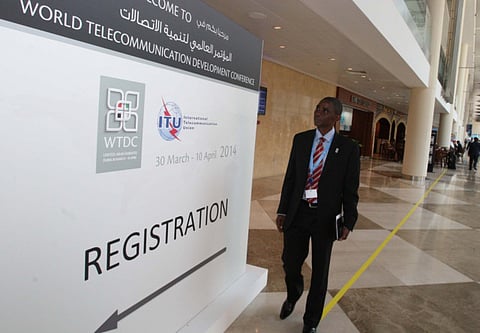Internet governance carries high stakes
It may take at least five years to arrive at a consensus, a top US official says

Dubai: Internet governance is a thorny issue and with the US announcing plans to give up control of online domain names and addresses, what will happen to the Internet Corporation for Assigned Names and Numbers (ICANN)?
ICANN is a non-profit organisation that is in charge of managing internet addresses since 1998. Its contract with the US government ends on September 25, 2015, and the US President Barack Obama wants to turn oversight to a multi-stakeholder system.
The internet governance issue boiled to the brim during the December 2012 World Conference on International Telecommunications held in Dubai and 55 countries, including the US, did not sign the final acts on internet governance.
Even ICANN’s president and CEO, Fadi Chehade, had told the US media that the organisation is inviting others to join them in developing the transition process and also supports Obama’s plan.
The issue was supercharged by revelations made by National Security Agency leaker Edward Snowden.
“ITU is the International Telecommunications Union and not the international internet union. The internet is a lot more than the telecommunications infrastructure; it is about virtual private networks, private networks, content and service that ride over all of those networks,” Ambassador Daniel A. Sepulveda, the US Coordinator for International Communications and Information Policy, said in an interview to Gulf News, on the sidelines of the ongoing World Telecommunication Development Conference (WTDC-14) being held in Dubai until April 10.
He said that if they [ITU] want to make it as an International Internet Union, “then we need to have a conference to come to that conclusion globally. We are not there yet. At the end of the day, it is an international market that has grown organically without centralised regulations.”
The internet has grown from 500,000 people in 1998 globally to 2.7 billion connections now. It was done without “central co-ordination and central mandates.”
“What the National Telecommunications and Information Administration under the Department of Commerce announced was that they are encouraging the community of internet users to come up with a proposal to replace the Department of Commerce’s contractual oversight over ICANN,” he said.
‘Fair process’
He added that the US has never intervened in the decisions of ICANN board. “We have never overturned the board’s decisions. What we are saying now is that what we conducted is a technical and clerical role to ensure the process was followed in order for the board to reach a proper conclusion or a conclusion with a fair process.”
“What we are saying is that the marketing or clerical function could be given to a separate group or to a multi-stakeholder system. There are countries in the world that are irritated that we have a relationship with ICANN. It is unfair or gives us a disproportionate advantage or control over the internet. We believe that neither are true, and once we transfer authority to a properly constructed multi-stakeholder proposal which could be anywhere from a year to five years,” Sepulveda said. He added that the agreement with ICANN is renewable for two years twice.
Sign up for the Daily Briefing
Get the latest news and updates straight to your inbox


